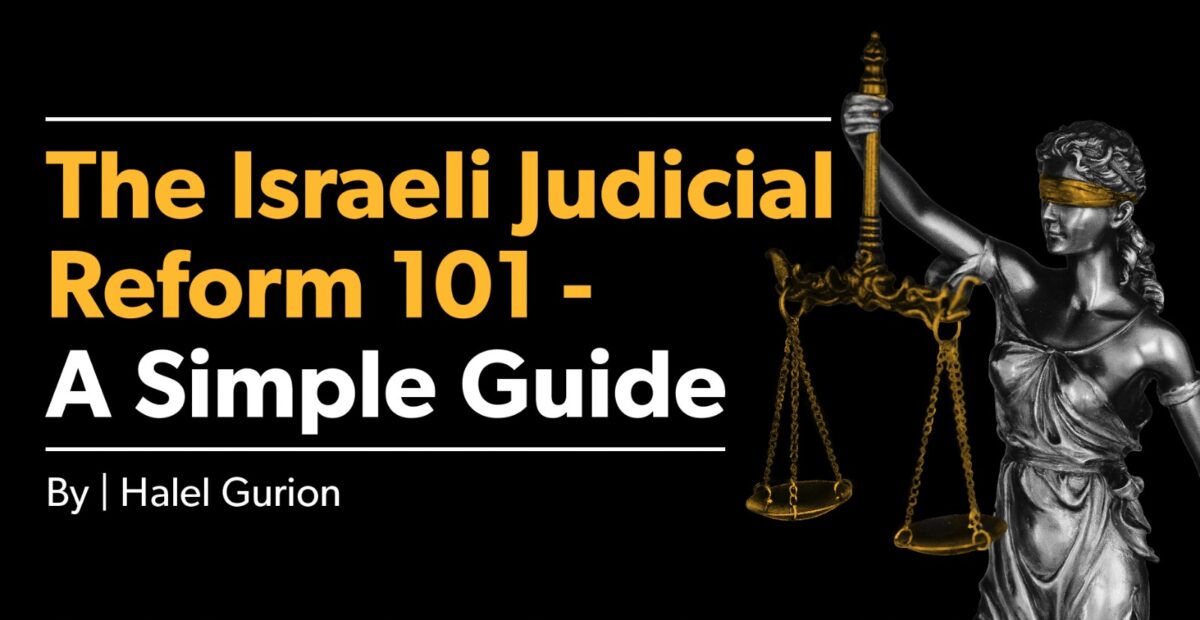The death of conscience: a simple explanation of the judicial reform
By Hillel Gurion
The Israeli judicial reform in its current form is aimed at lowering the voice of conscience to the point of silencing it. Therefore, beyond all the details, a question of trust arises: do you feel that the elected officials have reached such a high level of moral maturity that they do not need limitations? Have they gained such good skill on the road that you would agree to them driving the car without brakes?
Lately, I've been meeting people who say something like this: "Of course I've heard about the reform, but the truth is that I still haven't been able to understand what exactly it is about." Some oppose or support the reform out of some internal impulse, and others suppress and assume that personal life will not be affected. But everyone admits that they got a little lost in the forest of judicial terminology and procedures.
So to explain simply, let's start with something we all know a little better – ourselves.
In a simple analogy, the executive, legislative and judicial authorities can be compared to parts of the soul. Let's say, for example, that one evening I reflect on my health and lower back pain, shortness of breath on the stairs, and general fitness that has seen better days. Accordingly, my executive authority (the government) initiates and decides on a 'getting fit' policy and seeks to implement it. It turns to the legislative authority (Knesset), which states that tomorrow I will get up early in the morning, play some playlist from Spotify on the speaker, and start the day with half an hour of aerobic activity.
I go to sleep calmer, goal oriented and confident that tomorrow will be fine. Only then, without invitation, a nagging voice in my head wakes up, saying – "One second." If you turn on the speaker in the morning you will wake up Iris and the children. Why should they suffer?” This is the voice of the judiciary, the conscience. It takes me back to the Knesset, which is forced to change the language of the law, so that I listen to the music through headphones instead of the loudspeaker.
What a shame, I really don't feel like exercising for half an hour with headphones on my head. If only I could silence this conscience that interferes in everything, life would surely be more beautiful. Without it, I had an excellent policy with my neighbours, in relationships, at work: just do what I want. At the meeting with the psychologist, two days later, I want us to take care of the superego, give it root canal treatment until I'm free. She folds her hands and gives me such a soft look, indicating that I once again expressed a childish wish, and suggests that instead of completely eliminating the voice, maybe just lower the volume a bit.
As we will immediately see, the judicial reform is not satisfied with weakening the volume, but is aimed at eliminating the conscience. So regardless of political affiliation, now more than ever the question of trust in politicians arises. Is it possible to be calm and let them drive the country without brakes? A certain answer can be obtained from the democracy index (public trust survey) of the Israel Democracy Institute for 2022. According to the survey, the previous year the Knesset won 18% trust among the public and the political parties 9% (the High Court had 42%). Not particularly heartwarming numbers.
First step in the judicial reform: to be a nation free from legal advisors
There are two central principles that preserve democracy – one is the rule of law, and the other is the independence of the judges. The two principles are intertwined, and when one of them is violated, the democratic essence of a country is harmed. Unfortunately, this is what the judicial reform, also known as the Levin reform, may do (here are its main points as published on Yariv Levin’s, the Minister of Justice, Telegram channel).
Tonight I published the main points of the first phase of the governance reform:
– Changing the composition of the committee for the selection of judges: no longer a situation where the judges choose themselves in chambers without a protocol, but an equal representation of the three government authorities in the committee for the selection of judges.
– Regulating the disqualification of laws and the superseding clause: no more court discussion of basic laws, no more disqualification of laws by the Knesset without certification. Instead, the court will act by virtue of the basic laws and will not be above them. It will be possible to disqualify laws in theThe High Court of Justice in full composition and by a special majority.
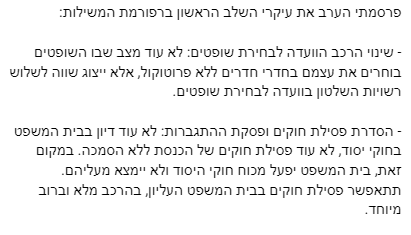
Part of the announcement on the Telegram channel of the Minister of Justice, Yariv Levin, from January 4, 2023
Apparently, the rule of law is a very simple principle. It says that everyone without exception, from the ordinary citizen to the prime minister, is subject to the law. And in order for this principle to be applied to the government as well, someone needs to say what it is not allowed to do, to be an impartial interpreter of the law. In Israel, this role is assigned to the legal advisor to the government (AKA Attorney General of Israel), currently attorney Gali Beharev Miara.
In fact, the definition of a consultant can be misleading. The Attorney General of Israel not only gives advice but is also in charge of the general prosecution, and is therefore authorised to prosecute those who violate the law. So when Advocate Beharev Miara explains to the government what the law says, but the government ignores her words, then she is knowingly violating the law and will not be able to claim that she acted in good faith. Simply put, the Attorney General of Israel’s 'advice' binds the government, and some people are very upset by this.
So for the sake of mental well-being, the first tier of the judicial reform deals with the powers and identity of the Attorney General of Israel. In fact, it deals with the powers of all the legal advisors in the government ministries. According to the reform, the legal advisors will become 'positions of trust', to people appointed by a minister or the government from among their close associates. An excellent method to stop receiving an unwanted interpretation of the law, and to proceed with ease.
The public law expert, Dr. Mittal Pinto, explains that this is where a door opens for governmental corruption. For example, a legal advisor close to the Minister of Infrastructure, helps tailor a tender for a company whose CEO is a member of the ruling party. This, instead of performing his role as an interpreter of the law, and making sure that the tender is proper and legal. But it turns out that even appointing associates, precisely where objective professionalism is required, is not enough.
The judicial reform also says that a legal advisor must be reduced to his linguistic definition – an advisor only. There is no obligation to accept his position. These things are also true regarding the legal advisor, whose role will be split and the power to submit indictments will be taken away from him or her. Without the ability to enforce, the legal advisor (and the other legal advisors) is simply another lawyer expressing their own opinion, and as we know, there is no shortage of such.
I think about the voice of conscience that sometimes bothers me, and in general about the laws of the country that I have to obey, and I am filled with jealousy of the government. Because when legal advisors become associates, who are only allowed to make recommendations anyway, the government will no longer hear that its moves are against the law. In other words, the government is not subject to the law. The principle of the rule of law, which is essential to democracy, suffers a severe blow.

The legal advisor for the government, attorney Gali Beharev Miara. Image from Wikipedia, by Tomer Jacobson
Second tier: I will choose who will judge me
As mentioned, the second fundamental principle of democracy is the independence of the judges. In Israel, the body responsible for appointing judges is called the Committee for the Selection of Judges, and it consists of nine members: two ministers (one of whom is the Minister of Justice), two members of the Knesset, two members of the Bar Association, and three judges of the The High Court of Justice (one is the president, and the other two rotate every 3 years, usually according to seniority).
Some believe that the committee's composition is balanced, while others claim problems in its conduct. The chairman of the Constitution, Law and Justice Committee, Simcha Rothman, even recently claimed that the Committee for the Appointment of Judges is a corrupt body. It is of course possible to criticise and strive for change. However, the judicial reform takes a huge step forward, and in fact 'opens the market of judges to competition'. If you can choose a cellular, internet or gas provider according to preferences, then why not judge? Just as private health policy holders can choose who will operate on them, the judicial reform also issues such a policy to the government.
According to the reform, the committee will consist of three ministers, the chairman of the constitutional committee and a member of Knesset from the coalition, the president of theThe High Court of Justice, two judges from each court, and a member of Knesset from the opposition. That is, if until now there were four politicians in the committee for appointing judges, from now on there will be six, of which five belong to the coalition. In a simple calculation: five of the nine members of the committee give the government a safe majority to select the desired judges.
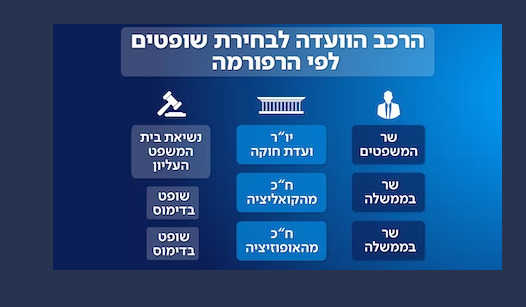
The composition of the committee for the selection of judges according to the reform. From an article on a corporate website Kan.
Since the reform transfers the majority of the committee from the professionals to the politicians, the ability to examine the legal competence of candidates is reduced, and in any case a central consideration in the appointments will be political. The automatic majority in the committee will allow the government and its supporters in the Knesset to appoint the judges, thus obtaining full government control over the content of legal decisions and criminal law.
For those who don't know, the committee for the selection of judges is also authorised to remove judges, and hence the government will be able to fire judges who do not act as it pleases. And for those who don't remember, judges are also human beings who are influenced by their environment. Take for example the situation of a judge, who is required to rule on a lawsuit, where one party is the son of a central member of one of the ruling parties. Will he dare acquit or convict the 'wrong' person under the fear that the next commission will swallow him? Or, for example, will a judge dare reject another arrest request by the police, after having done it 'too many' times for the coalition's liking?
In fact, the reform leads to judges becoming civil servants, subordinate to the government like the police and the prosecutor's office. We will see which judge will dare to make decisions that the government does not like. In this way, the second essential principle of democracy, the independence of the judges, is also lost.
Third tier: There is no limit to governance
A central claim regarding governance in Israel is that the gatekeepers do not allow the government to implement the voter's will. Therefore, weakening the gatekeepers is essential for the expression of the will of the people, as befits a democracy. But if you take the idea to the extreme, and eliminate the power of the gatekeepers, the result is actually a dictatorship. A direct and fast line will pass between the will of the government (and its leader), and its actual expression.
Besides determining the identity of judges and legal advisors, the judicial reform takes several measures to strengthen governance:
Want to decide something? Let's call it a fundamental law
Basic laws are laws that are intended to form the basis of the constitution. They are the ones who determine the rules of the game, and enjoy a special status that surpasses that of normal rules. Therefore, they are supposed to deal with fundamental issues, such as freedom of occupation, human dignity and freedom, a referendum, and the like. However, especially in recent years there has been an abuse of their position, in order to serve short-term political interests, with hasty decisions, for one-time use and narrow considerations.
According to the Israel Democracy Institute, in the last 5 years, 20 amendments to basic laws have been made in Israel, much more than in other Western countries. Although the High Court rarely interfered, it nevertheless determined, for example, that the amendment to the Basic Law: The Knesset in May 2021, misuses the power of the Knesset and only benefits the current government, so it is not admissible.
According to the reform, the The High Court of Justice will no longer be able to invalidate fundamental laws. Therefore, all the Knesset has to do in order to prevent interference is to simply call some law a 'fundamental law', pass it with a simple majority, and there is no one who can do anything. For example, the Knesset can enact a basic law: mandatory kosher food in all restaurants, a basic law: allowing private construction on Israel's coasts, or, a basic law: privatising streams for purchase at the highest price.
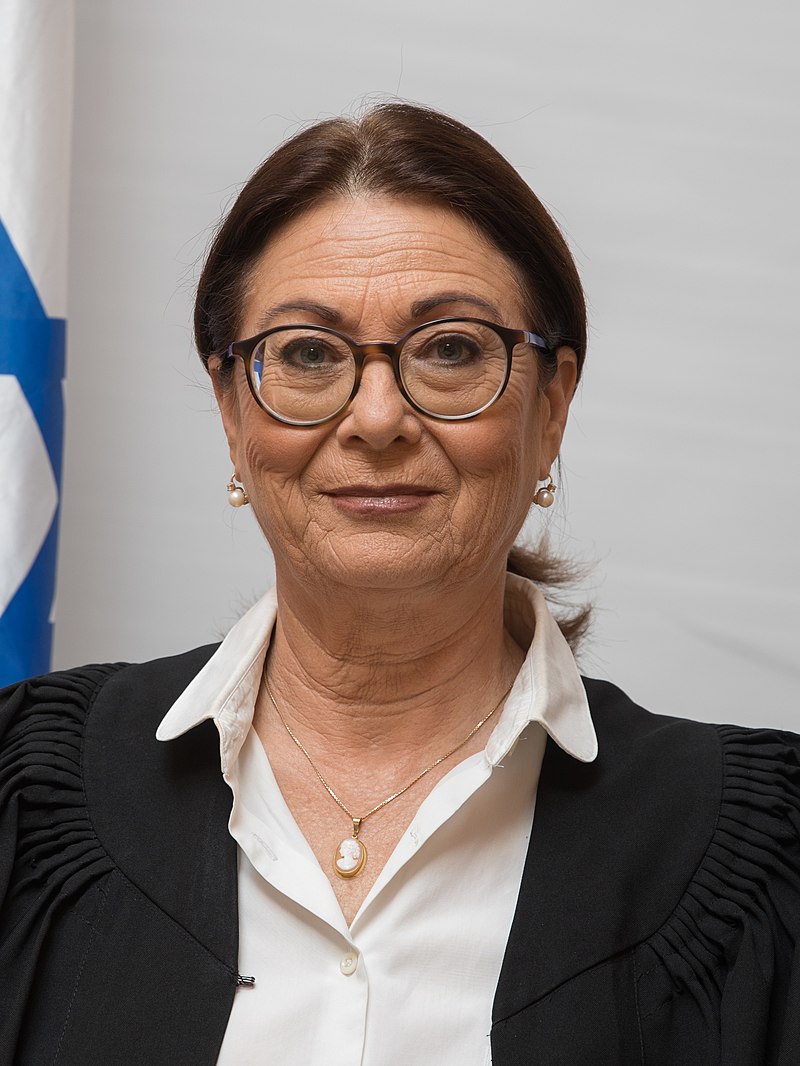
President of the Supreme Court since 2017, Judge Esther Hayut. Image from Wikipedia
But the truth is that the reform goes further. As mentioned, fundamental laws enjoy a special status compared to ordinary laws. Their status is expressed in the fact that if a certain ordinary law is enacted, which contradicts a fundamental law and infringes on the rights derived from it, the High Court of Justice can check whether the infringement of rights is for a proportionate and appropriate purpose. If the purpose is inappropriate, the High Court can annul the law. However, the reform also removes this power from the hands of the court, and transfers it to the Knesset. That is, the Knesset is the one who will enact the laws, and will also be its own judge, the final arbiter regarding the purpose and proportionality of violations of fundamental laws.
Do you have an idea? Just do it!
The reason of reasonableness means that the court can examine and even reject an action or decision of the government, of a local authority and other bodies, if they are flawed by unreasonableness. For example, the High Court of Justice ruled in 2014 that the refusal of the Kfar Vradim local council to build a mikveh in its territory is not reasonable, and obliges the council to build a mikveh where those observing mitzvot and tradition can bathe. Or for example, about a month ago the High Court of Justice invalidated the appointment of Aryeh Deri as a minister in the government, since in its opinion the appointment was extremely improbable.
One can of course argue about what 'reasonable' is, and emphasise that what is reasonable to me is not reasonable to you. But it is important to understand that the great power of the reason for reasonableness does not lie precisely in one or another intervention of the court. The importance lies in the knowledge of a minister, mayor, director of government offices, etc., that he or she does not operate in a vacuum. They cannot appoint for positions or enact by-laws just like that, simply because it suits them, and this is an essential incentive for making well-considered decisions.
The judicial reform will prevent judges from invalidating decisions on behalf of the government or authorities, even if they are extremely unreasonable. In doing so, it locks the door to which citizens affected by arbitrary and offensive decisions can turn. On the other hand, it opens the door to making decisions as the decision maker sees fit. In the article in De Marker, Avi Barali brought some simple, but painful examples. For example, an order by the mayor to close all balconies facing the street (at the expense of their owners), an order that all bathing beaches will henceforth be paid for, or the cancellation of the transparency requirement from a polluting factory in the city.
The reform gives a 'green light' to the decision-makers to act according to their understanding, according to their whims, and according to the narrow interests of close associates, supporters, capitalists and the like. And the little citizen no longer has anyone to turn to.
Normal rules – plug the last hole
If you look at the judicial reform as a move to eliminate conscience, it is hard not to admire the thoroughness of the Minister of Justice, Yariv Levin, and the Chairman of the Constitutional Committee, Simcha Rothman. As mentioned, according to the reform, the The High Court of Justice will not be able to disqualify basic laws, and even if it disqualifies ordinary laws that contradict basic laws, the Knesset will be able to cancel the disqualification. But there still remains a small and annoying 'hole' in the system, the hole of the usual laws that the Knesset frequently enacts, those that do not fall into a certain category. Apparently, there is still a small risk that the High Court will reject them.
Chairman of the Constitution Committee Simcha Rothman, Minister of Justice Yariv Levin and Prime Minister Binyamin Netanyahu in the Knesset Plenum. Davar newspaper
Imagine, for example, that the Knesset of the left parties enacted two new laws. One says that every citizen living in Judea and Samaria owes a tax of thousands of shekels to finance the state's defence expenses. The second says that every person who defines himself as 'religious' is liable for tax to finance the Chief Rabbinate of Israel, the local Rabbinate and so on. These laws are so discriminatory that even the judges, appointed as mentioned by the government and acting according to the spirit of the commander, decide to disqualify them.
This is a problem for those who want governance, and therefore the reform states that the High Court of Justice can only annul an ordinary law with a majority of 80% of all judges in the High Court. This requires a gathering of all 15 High Court judges, due to the complexities and delays involved, and of course, the chance of agreement between 12 judges on a certain issue is close to zero. But it turns out that this is not enough either.
In the almost impossible case where 12 out of 15 judges vote to invalidate a law, the Knesset with a majority of 61 will still be able to cancel the decision and re-enact the law (the superseding clause). If so, what is the point of convening all the judges of the High Court? No real point. In any case, the meaning is that as long as the government has a majority in the Knesset, it can enact any law as it sees fit. On the other hand, the rule of law applies to it as a 'recommendation' only.
So what is actually going on here?
Apart from the above, the judicial reform plans other moves. For example, the reform is aimed at reducing the right to stand, that is, the conditions that allow a person to file a legal claim. Today, the right to stand allows claims to be filed even by those who have not suffered personal injury, and who are not in the context of a conflict. For example, an environmental association can apply to the High Court to prevent the destruction of rare habitats, and make the voices of the animals and plants, who suffer significant disadvantages in front of polluting energy companies and capitalists, heard. No wonder environmental organisations started a fight against the reform, which could eliminate their ability to stand before the court.
There are other components to the reform, but the bottom line conclusion is quite simple: since the government has a majority in the Knesset, and since no one can bind the Knesset to any norm, then the government can establish any norm that comes to its mind. Its power is unlimited. And what will it do with this power? As usual, do what is necessary to benefit its supporters, maintain the coalition, promote the interests of the owners of capital and influence, and harm the opponents.
True, all this is already happening, but what will change is that the government no longer has limitations or criticism, the door to decision-making is broken, and the victimised citizen cannot do anything. If before the judicial reform passed The Economist defined Israel as a 'flawed democracy', then after it passed the rating could deteriorate to a 'hybrid regime' (Turkey) or an 'authoritarian regime' (Russia).
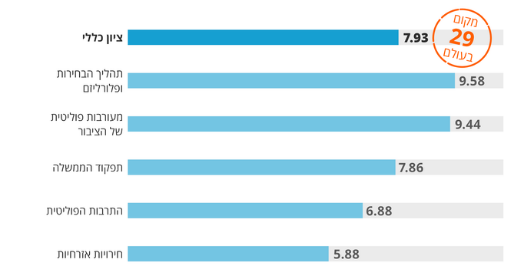
Israel is in 29th place in the world in the Economist's democracy index for 2022. The country continues to fall in the ranking and is rated as a "flawed democracy" – even before the judicial reform. Image from an article in Haaretz newspaper.
After the reform passes, what will prevent a right-wing or left-wing government from announcing that elections will be held every 8 years, or from deciding that a prime minister will be elected for the rest of his life? A judge who was chosen as a political appointee will certainly not prevent this, and knows that the Knesset must overcome him or her with a majority of 61. And so, one morning, according to the whims of some prime minister or members of his or her family, we will find ourselves faced with two very bad options: to crown a king or to start a fratricidal war.
In the end, we return to the question of trust: do you believe that the politicians, and those who influence them, have reached such a clean level, so morally mature, that the limitations can be removed from them? Can you yourself, in your family life, with your work colleagues, with your neighbours, live well without the sometimes hindering voice of conscience? Because if not, you should understand that's where we're going.
* Thanks to my friend, Guy Shemer, for the analogy between state authorities and parts of the soul.

